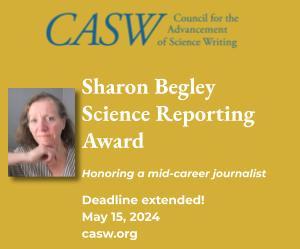This story was published as part of the 2024 Travel Fellowship Program to AAAS organized by the NASW Education Committee, providing science journalism practice and experience for undergraduate and graduate students.
Story by Emily Engelbart
Mentored and edited by Shel Evergreen
DENVER — As the climate crisis worsens, some are looking to arm a new generation with the skills to overcome it. Community college professors across Washington state are incorporating climate justice into a wide range of courses through the C-JUSTICE program , or Climate Justice in Undergraduate STEM, Incorporating Civic Engagement.
“It really tries to humanize and anchor STEM content in equity,” said Sonya Remington Doucette, principal investigator for C-JUSTICE and a senior associate professor at Bellevue College. Doucette spoke among several panelists at a Feb. 17 talk during the American Association for the Advancement of Science annual meeting. “We try to empower students with civic skills and knowledge.”
Biology professors teach students about the disproportionate health impacts of heatwaves and redlining — a discriminatory housing practice targeted at minority groups. As another example, math professors incorporate health statistics from individuals who live along the Mississippi River between Baton Rouge and New Orleans, known as Cancer Alley, and are highly exposed to a chemical composed of petroleum and natural gas.
After receiving funding in 2021 from the National Science Foundation, Doucette and collaborators have been implementing C-JUSTICE in a way that teaches the real-world applications of science, facilitates an inclusive STEM workforce and supports STEM faculty. This program has now been adopted by 17 community colleges in Washington.
Faculty members using C-JUSTICE sprinkle climate justice and civic engagement content into courses through course modules. Under this framework, professors teach by connecting STEM concepts and skills, engaging with climate justice, empowering with civic engagement, and inspiring with positive stories. Students learn about issues like food security and human health impacts from climate change.
According to Doucette, C-JUSTICE was formed partially in response to a curriculum she developed in 2017, Climate Justice Across the Curriculum, aimed at all disciplines, from social work to business. Because STEM faculty struggled the most to incorporate climate justice into their courses under the initial curriculum, Doucette said that C-JUSTICE has been modified for them to more feasibly teach climate justice alongside their usual content.
In her presentation, Doucette shared a quote from a high-performing Black student who left their engineering major, excerpted from researcher Elaine Seymour’s 1997 book. This anonymous student said, “A big concern of a lot of black students is we feel like we’re being prepared to go into white corporate America, and it won’t really help our community…that’s a very serious concern.”
According to Doucette’s data comprising student feedback, the number of students who viewed science as a tool for social change increased after they took the climate justice course — from 82 to 92 percent. Doucette pointed to research illustrating how this can benefit students who are underrepresented in STEM fields — like women and students of color — who would be more likely to remain in the field when understanding their vulnerability against climate change, and how STEM fields can provide a platform to combat the crisis.
Down south, Ethell Vereen is also identifying ways to streamline culturally inclusive and relevant learning as it pertains to the environment, as minority groups often suffer the worst consequences of climate change, toxic pollution and more.
“Environmental education is this process that allows individuals to explore their own issues, get into problem-solving, and take action to improve the environment,” said Ethell Vereen, another panelist at the talk and an assistant professor in the Biology Department at Morehouse College — a historically Black college in Atlanta, Georgia.
Vereen has developed an environmental justice module for an environmental studies lab course where upper-level undergraduate students at Morehouse College use real-world data to learn about civic engagement, problem-solving skills, and environmental justice. His students explore environmental justice issues relevant to Atlanta, like the intersection between redlining, environmental issues, and socioeconomic factors by using data from the Environmental Protection Agency, through geospatial mapping, and more.
The results of Vereen’s lab course have been overwhelmingly positive, according to his paper published in the journal Ecological Applications in 2022. It has allowed students to unpack the environmental consequences of systemic racism.
In reference to Doucette’s course on the local and international impacts of carbon dioxide and particulate matter, Professor of Practice Emerita Patricia Marsteller said, “Shoot, I might be a chemist if I had taken her course.”
Emily Engelbart is a freelance science writer in Austin. In 2023, she earned a B.A. in Journalism and a Certificate in Environment & Sustainability from The University of Texas at Austin. She has written for The Austin Chronicle, as well as UT’s College of Natural Sciences and Jackson School of Geosciences, along with its student-led magazine, Drift, centered around the environment and outdoors. Additionally, she worked on the communications team at the Lady Bird Johnson Wildflower Center, writing conservation-focused articles for its magazine. Visit her published in the journal websitewebsite or email her emilyengelbart@gmail.com.
Edited by: Shel Evergreen
Top Image: Redlining in cities like Seattle has forced historically disadvantaged groups to experience disproportionately harsh conditions — e.g. less urban tree canopy, fewer parks, and underfunded schools. Through the C-JUSTICE curriculum, community college students of different majors engage with these kinds of issues. Credit: Mapping Inequality
Founded in 1934 with a mission to fight for the free flow of science news, NASW is an organization of ~ 3,000 professional journalists, authors, editors, producers, public information officers, students and people who write and produce material intended to inform the public about science, health, engineering, and technology. To learn more, visit www.nasw.org.

.png)

